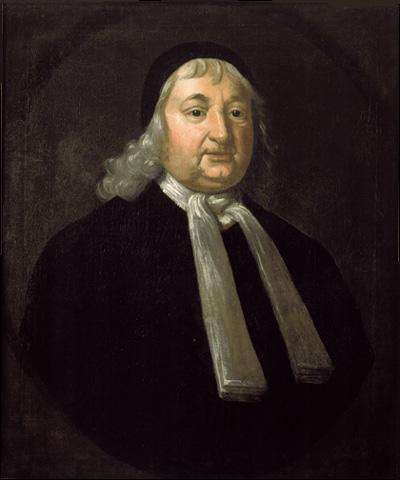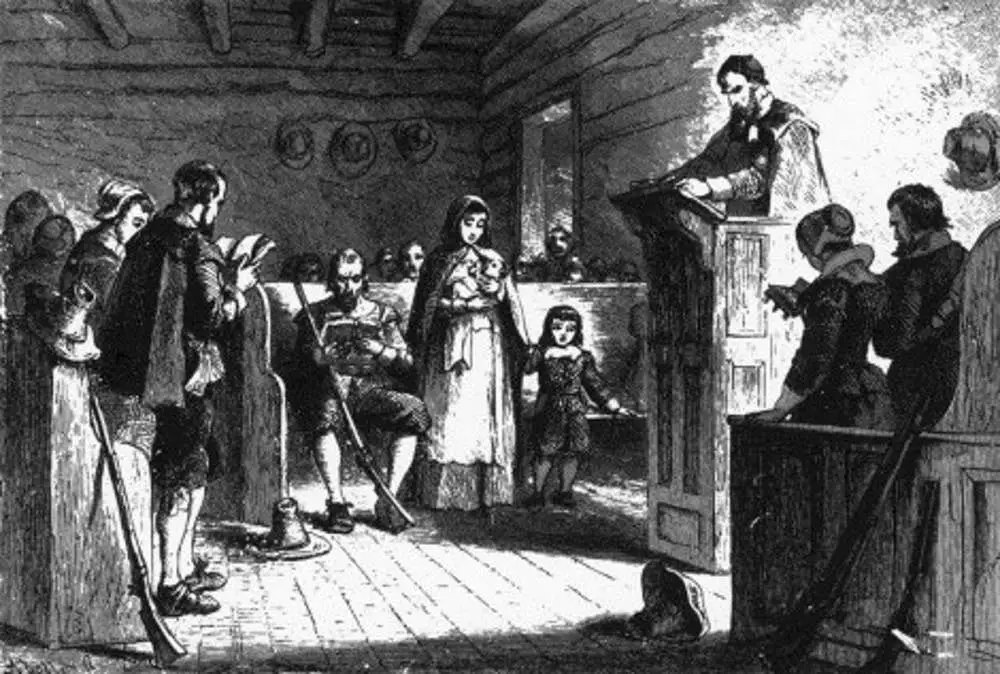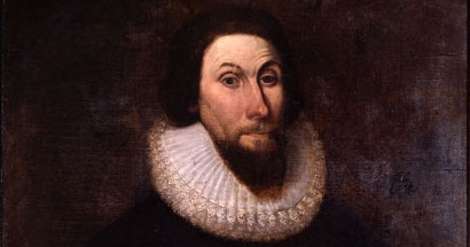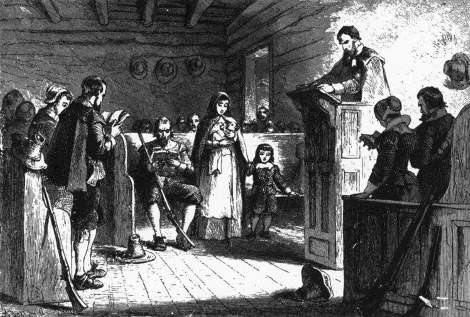John Winthrop famously wrote in his journal that the Arbella departed for the New World on Easter Monday – March 29, 1630. But the Puritan Easter would soon disappear from his records.
Upon arriving in the Massachusetts Bay Colony, Winthrop and his fellow Puritans took pains to avoid even mentioning the word “Easter.”
The Puritans wanted to abolish all references to pagan gods and popish rituals. The Bible didn’t mention holidays, they reasoned, so saints’ days and feast days were nothing more than Roman inventions.
“They for whom all days are holy can have no holiday,” they liked to say.

No Puritan Easter for Samuel Sewall either
Judge Samuel Sewall, the Puritan diarist born in 1652, once wrote in his journal that he’d been given an almanac. He crossed out all the papist holidays in the new book. “I blotted against Feb. 14, Valentine, March 25, Annunciation of the B. Virgin; April 24, Easter; Sept. 29, Michaelmas; Dec. 25 Christmas; and no more,” he wrote.
Puritan Easter
The early Puritans didn’t like Easter any more than they liked Christmas. They banned Christmas in 1659, fining anyone five shillings for celebrating the holiday. They ignored Easter, Whitsunday and other holidays. May Day celebrations, which included the hated Maypole, were punished severely.
The Puritans did loosen up one Anglican tradition. Unlike the Anglicans, they allowed marriage to take place during Lent. And they sometimes observed Fast Day on Good Friday.
Easter posed a few problems, though. It always fell on a Sunday, and Puritan preachers weren’t sure what they should say in their sermons. The usual solution was to preach about something other than Easter.
They also couldn’t ignore Easter, because they determined Election Day by the Easter calendar. Election Day was actually one of the four important secular holidays the Puritans celebrated, along with Commencement Day, Thanksgiving and Training Day.
Puritans thought it unchristian to use the names of heathenish deities. For a while, they managed to abandon the word ‘Monday’ and all the rest of the days of the week, as well as the names of the months.
So Sunday, derived from the Teutonic name for its sun deity, Sonntag, became simply the first. Monday was the second, Tuesday the third, and so forth.
The Puritans also called the months by numbers, with March being the first and February the twelfth.
Eventually, the traditional names for days and months crept back into the Puritan vocabulary.
Devil on the March
The Puritans weren’t the only people living in Massachusetts Bay Colony. Anglicans, Huguenots and Catholics, for example, had also immigrated to the New World.
When King James II took the English throne, he consolidated the northeastern colonies. Then in 1686 he appointed Sir Edmund Andros governor of the Dominion of New England.
It wouldn’t end well. Neither James nor Andros were fans of the Puritans. And the Puritans considered Andros a “bigoted papist.”
When Andros came to Massachusetts, he restored the popish holidays, celebrated royal holidays and allowed a Maypole in Charlestown. Puritan minister Increase Mather was appalled. The devil had “begun his march of triumph,” he wrote.
The Puritans had forced Anglicans to hold services in the open air. Andros wrangled with the Puritan theocracy, and he insisted on holding Anglican services at Old South Meeting House. On Good Friday in 1687, he ordered the sexton to open the doors of Old South and ring the bell for ‘those of the Church of England.’ Whether Andros persuaded or coerced the sexton is not known, but the doors opened, the bell rang and the service went forward.
The Puritans could not forgive that particular affront. They revolted in 1689 and sent Andros packing back to England.
This story about Puritan Easter was updated in 2022.




5 comments
[…] and attending sunrise services. They are based on pagan superstitions, which of course is why the Puritans didn't celebrate Easter. (The Puritans didn't like Christmas, either.) For the early Puritans, celebrating the Lord's Day […]
Puritans were a rather dour people. They seemed determined to make life miserable. Not surprising that the witch incidents grew out of these repressed, gossipy citizens.
The “Puritans” and “Separatist” settled in Boston and Plymouth. They were the progressives of their day,so to speak. In London most of the founders of the Royal Society (science) were puritans. They were also known as Congregationalists and today The United Church of Christ – the church Obama was a member for 20 years. However Obama had to leave – the denomination was actually too liberal for him and his reputation. – I was ordained in the UCC decades ago. It had 2 million members – since then, they have lost most of their membership – or at very least by half. And they continue to leave, many repulsed by elitism and “in your face” progressive causes.
[…] to the Church of England’s embrace of Catholic traditions. They banned Christmas and viewed Easter with the same disdain. They had no use for hot cross buns, ashes on foreheads, handing out palms or […]
The Puritans strike me as the spiritual ancestors of today’s ‘social justice warriors’, always out to efface their own history, heritage and culture, while imposing their own version of ‘political correctness’ on the rest.
Comments are closed.